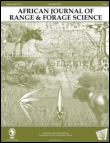
AFRICAN JOURNAL OF RANGE & FORAGE SCIENCE
Scope & Guideline
Advancing Knowledge in Animal Science and Ecology
Introduction
Aims and Scopes
- Sustainable Rangeland Management:
Research that addresses the sustainable use and management of rangelands, including the impacts of grazing, fire management, and ecological restoration practices. - Ecosystem Services and Biodiversity:
Studies exploring the multifaceted ecosystem services provided by rangelands, including biodiversity conservation, carbon sequestration, and water regulation. - Pastoralism and Livelihoods:
Investigations into the socio-economic dimensions of pastoralism, including the relationship between livestock management practices and the livelihoods of pastoral communities. - Forage Quality and Animal Nutrition:
Research focusing on the nutritional quality of forage species and their implications for livestock production and animal health. - Climate Change and Environmental Impact:
Studies assessing the effects of climate change on rangeland ecosystems and developing strategies for resilience and adaptation. - Innovative Management Practices:
Research promoting innovative practices in rangeland and forage management, including the use of technology and participatory approaches.
Trending and Emerging
- Remote Sensing and Technological Applications:
There is a growing trend in the use of remote sensing technologies for estimating biomass and assessing vegetation health, reflecting a shift towards data-driven management strategies. - Multifunctionality of Rangelands:
Research is increasingly addressing the multifunctional roles of rangelands beyond traditional grazing, including ecosystem services like carbon storage, water filtration, and recreational opportunities. - Climate Resilience and Adaptation Strategies:
Emerging studies focus on climate change impacts and adaptation strategies for rangeland management, emphasizing the need for resilience in pastoral systems. - Participatory Approaches in Rangeland Management:
There is an increasing emphasis on participatory methods that involve local communities in the management and assessment of rangelands, highlighting the importance of stakeholder engagement. - Diversity and Composition of Forage Species:
Research is increasingly exploring the diversity and composition of forage species, particularly in the context of changing climatic conditions and land use practices.
Declining or Waning
- Historical Perspectives on Fire Management:
Although fire management remains a critical aspect of rangeland ecology, studies focusing solely on historical fire regimes and their impacts have decreased, indicating a potential shift towards more integrative approaches that combine fire management with other ecological factors. - Traditional Knowledge Systems:
Research that emphasizes indigenous knowledge systems in rangeland management appears to be waning, possibly overshadowed by empirical studies that prioritize scientific approaches over traditional practices. - Geographical Specificity in Studies:
Papers focusing on specific geographical regions, such as localized studies of rangeland management in isolated areas, have become less prominent. The journal may be trending towards broader, more generalizable studies that apply across multiple contexts.
Similar Journals

Ecosistemas
Fostering biodiversity insights and ecological innovation.Ecosistemas is a prominent Open Access journal published by the ASOCIACION ESPANOLA ECOLOGIA TERRESTRE, specializing in the field of ecology. Since its inception in 2001, it has dedicated itself to advancing ecological knowledge and research, fostering an inclusive platform for the dissemination of cutting-edge studies that span ecological interactions, sustainability, and biodiversity. The journal, based in Spain, has established its reputation with notable rankings such as Q3 in the field of Ecology and Q4 in Ecology, Evolution, Behavior, and Systematics, reflecting its commitment to quality research. With a Scopus Ranks position placing it in the 40th and 37th percentiles for its categories, Ecosistemas is integral to the academic community, serving researchers, professionals, and students alike. It provides a vital resource for those seeking to understand ecological dynamics and environmental challenges, facilitating open access to important findings and discussions that shape the future of our ecosystems.
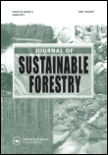
Journal of Sustainable Forestry
Connecting research and policy for sustainable forest management.Journal of Sustainable Forestry is a premier academic publication dedicated to advancing knowledge and practices in the field of sustainable forestry and environmental management. Published by Taylor & Francis Inc in the United Kingdom, this journal has been a cornerstone for researchers and professionals since its inception in 1992. With an impressive reputation, it boasts a 2023 Q2 ranking in Food Science, Forestry, and Geography, Planning and Development, highlighting its significant contribution to interrelated disciplines. The journal’s impact is further underscored by its Scopus ranking, especially in Forestry where it holds the 43rd position out of 174 publications, placing it in the 75th percentile. Although not open access, the journal remains committed to providing innovative research and practical insights into forest management, ecological sustainability, and policy development. As the field of sustainable forestry continues to evolve, the Journal of Sustainable Forestry serves as an essential resource for those committed to advancing sustainable practices globally, fostering a deeper understanding of how sustainable forestry can contribute to environmental resilience and biodiversity conservation.

Nature Food
Exploring the Intersection of Agronomy and Culinary Science.Nature Food, an esteemed journal published by NATURE PORTFOLIO, stands at the forefront of research in Agronomy, Animal Science, and Food Science. With its E-ISSN 2662-1355 and a remarkable recognition of being ranked Q1 in three essential categories by Scopus in 2023, it is tailored for researchers, professionals, and students dedicated to the advancement of knowledge in these fields. Situated in the United Kingdom and extending its reach globally, the journal has displayed an impressive ranking, placing it in the top percentiles of Agricultural and Biological Sciences, highlighting its vital place in fostering innovative research and scholarly communication. The journal's scope encompasses a wide array of topics critical to food systems, sustainability, and agricultural practices, making it an invaluable resource for anyone looking to stay ahead in this dynamic area of study. With access options designed to enhance the visibility and dissemination of research findings, Nature Food is committed to promoting open dialogue and collaboration among the global academic community, driving forward our understanding of food security and environmental stewardship.

NEW FORESTS
Cultivating Knowledge for Sustainable Forest Practices.NEW FORESTS, published by SPRINGER, stands at the forefront of forestry research, delivering cutting-edge insights into forest science, management, and conservation. With an ISSN of 0169-4286 and an E-ISSN of 1573-5095, this esteemed journal has earned a distinguished reputation as it continues to contribute significantly to the field since its inception in 1986. As evidenced by its impressive ranking in the Q1 category for Forestry and being positioned at #32/174 in the Scopus Ranks for Agricultural and Biological Sciences, NEW FORESTS maintains an 81st percentile standing, emphasizing its influential role in advancing scientific discourse. The journal focuses on a diverse array of topics within the realm of forestry, making it an essential resource for researchers, professionals, and students eager to engage with contemporary developments and challenges in forest ecosystems. Although it is not an open-access journal, access to its articles can be facilitated through various academic institutions and libraries, ensuring that vital research is available to a broad audience. As we look toward the future, NEW FORESTS continues to strive for excellence, fostering dialogue and collaboration among scholars committed to sustainable forest management and restoration until at least 2024.
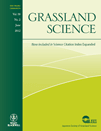
GRASSLAND SCIENCE
Connecting disciplines for comprehensive grassland studies.GRASSLAND SCIENCE is a highly regarded journal published by Wiley that spans a diverse range of disciplines related to the study and management of grasslands. With its ISSN 1744-6961 and E-ISSN 1744-697X, this publication has established a firm footing within the academic community since its inception in 2009. Notably positioned in the Q2 quartile for Agronomy and Crop Science and Q3 quartiles for Ecology, Evolution, Behavior and Systematics and Plant Science, GRASSLAND SCIENCE aims to advance the understanding and sustainable management of grassland ecosystems, addressing critical issues such as biodiversity, land use, and climate change. Although the journal does not currently offer an open-access model, it provides comprehensive insights and research findings that are invaluable to researchers, professionals, and students engaged in agronomy, ecology, and environmental studies. With a commitment to fostering collaboration and innovation, GRASSLAND SCIENCE is a vital resource for those dedicated to enhancing the ecological and agricultural significance of grasslands worldwide.
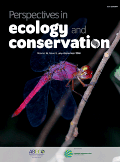
Perspectives in Ecology and Conservation
Exploring critical perspectives in ecology and environmental management.Perspectives in Ecology and Conservation, published by Elsevier Science Ltd, is a leading academic journal dedicated to advancing the fields of ecology, conservation, and environmental management. With a Q1 ranking in multiple categories, including Ecology, Management, Monitoring, Policy and Law, and Nature and Landscape Conservation, this journal boasts an impressive standing among its peers, making it essential reading for researchers and professionals. Since its inception in 2017 and running through 2024, it aims to provide innovative perspectives and critical analyses that enhance our understanding and practices in conservation science. The journal is accessible through open access options, facilitating broader dissemination of knowledge. Its commitment to addressing contemporary ecological challenges reinforces its importance in the academic community, promoting sustainable practices and informed policy-making in the face of urgent environmental issues.
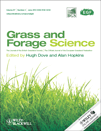
GRASS AND FORAGE SCIENCE
Transforming Agricultural Practices with Cutting-Edge ResearchGrass and Forage Science is a premier journal published by Wiley, dedicated to advancing the fields of agronomy and crop science, as well as environmental science management. With its ISSN 0142-5242 and E-ISSN 1365-2494, this esteemed journal has been a cornerstone of scholarly communication since its inception in 1946, and it continues to provide critical insights into the cultivation and sustainability of grasslands and forage systems through to 2024. Recognized within the academic community, it holds a distinguished Q1 ranking in Agronomy and Crop Science and a Q2 ranking in Management, Monitoring, Policy and Law, highlighting its significant impact and contribution to these essential domains. Researchers, professionals, and students alike benefit from the rigorous peer-reviewed articles that address contemporary challenges and innovations in land management, grassland farming, and ecological sustainability. While the journal operates under a subscription model, its breadth of expertise makes it an invaluable resource for anyone engaged in agricultural and environmental sciences. In an era where sustainable practices are paramount, Grass and Forage Science stands at the forefront, driving the conversation and fostering advancements in the way we manage and utilize our natural resources.

CANADIAN JOURNAL OF ZOOLOGY
Innovating Insights in Animal Biology and EnvironmentWelcome to the Canadian Journal of Zoology, a leading academic journal in the fields of Animal Science and Zoology as well as Ecology, Evolution, Behavior and Systematics. Published by Canadian Science Publishing since 1965, this esteemed journal serves as a vital platform for researchers, professionals, and students to disseminate and engage with significant findings in zoological and ecological research. With an impact factor placing it in the Q2 category and rankings reflecting its influence (201/490 in Animal Science and Zoology; 372/721 in Ecology), the journal is committed to advancing the understanding of animal biology and environmental interactions. Although currently not an open access publication, it provides comprehensive resources and studies that are crucial for the academic community. Based in Ottawa, Canada, the journal continues to push the boundary of knowledge right up to 2024 and beyond, making it an essential resource for anyone dedicated to the life sciences.

Journal of Forest Science
Connecting researchers to cultivate ecological wisdom.Journal of Forest Science, published by the Czech Academy Agricultural Sciences, serves as a pivotal resource in the field of forestry and soil science. With its ISSN 1212-4834 and E-ISSN 1805-935X, this Open Access journal has been delivering insightful research since 2003, making knowledge freely available to researchers and practitioners globally. Hailing from the Czech Republic, the journal has established a notable impact within the academic community, as evidenced by its placements in the Q2 quartile for Forestry and Q3 for Soil Science according to the latest rankings. This positions the Journal of Forest Science favorably within academic discourse, ranking #73 out of 174 in Forestry and #84 out of 159 in Soil Science on Scopus, placing it at the 58th and 47th percentiles respectively. Covering a wide range of topics that intersect with environmental sustainability, forest management, and ecological research, the journal aims to foster innovation and collaboration within the scientific community. Researchers, professionals, and students can access published articles easily, bolstering the advancement of knowledge in forest science and its related disciplines.
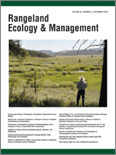
Rangeland Ecology & Management
Transforming Research into Action for Rangeland SustainabilityRangeland Ecology & Management, published by ELSEVIER, is a leading academic journal dedicated to the interdisciplinary exploration of varied aspects of rangeland ecosystems, including their sustainable management and conservation. With an ISSN of 1550-7424 and an E-ISSN of 1551-5028, the journal has established itself as a vital resource in the fields of Animal Science and Zoology, Ecology, and Management, Monitoring, Policy and Law, achieving prominent Q1 quartile rankings in these categories as of 2023. The journal's significant Scopus rankings further attest to its impact, securing a position in the top percentiles of related fields. Published of noteworthy research from 2005 to 2024, Rangeland Ecology & Management serves not only as an academic platform but also fosters meaningful discussions on rangeland policy implications across the globe. The journal offers both subscription and Open Access options, ensuring that innovative research is readily available to researchers, professionals, and students passionate about ecology and sustainable practices. Join the Rangeland Ecology & Management community and contribute to advancing our understanding of rangeland ecosystems.